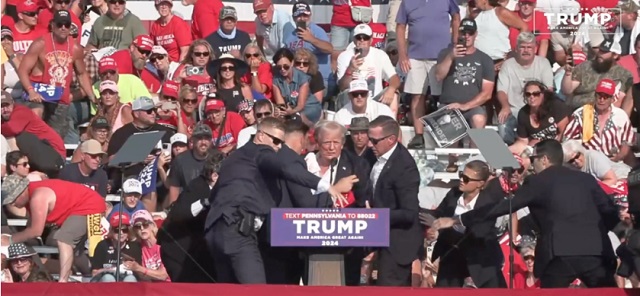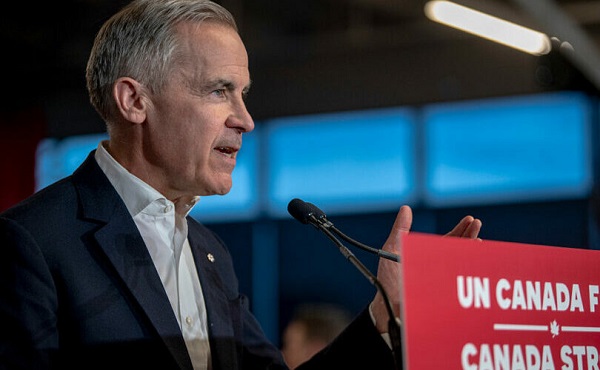International
Hawley: Whistleblowers say Trump’s security detail was unprepared, inexperienced

From The Center Square
Senate committee holding bipartisan investigation, hearing
Multiple whistleblowers have come forward telling U.S. Sen. Josh Hawley, R-Mo., that many working as part of former President Donald Trump’s security detail at a rally in Pennsylvania one week ago weren’t Secret Service and were “unprepared and inexperienced personnel,” Hawley says.
The accusation comes after the U.S. Senate Homeland Security and Governmental Affairs Committee, on which Hawley sits, announced it will conduct a bipartisan investigation into the July 13 assassination attempt of Trump.
Multiple whistleblowers contacted his office “with disturbing new information behind the assassination attempt on the former president,” he said.
They did so after Hawley opened a whistleblower tip line, pledging to protect the anonymity of everyone who contacts his office. Whistleblowers are encouraged to make protected disclosures by calling (202) 224-6154 or emailing [email protected].
In response to the information he has received so far, Hawley contacted Department of Homeland Security Secretary Alejandro Mayorkas, who oversees the U.S. Secret Service, demanding answers.
“Whistleblowers who have direct knowledge of the event have approached my office. According to the allegations, the July 13 rally was considered to be a ‘loose’ security event,” he wrote to Mayorkas.
“Whistleblower allegations suggest the majority of DHS officials were not in fact USSS agents but instead drawn from the department’s Homeland Security Investigations. This is especially concerning given that HSI agents were unfamiliar with standard protocols typically used at these types of events, according to the allegations.”
Other security failures identified, he says, include not using canine units to monitor entry and detect threats among the perimeter or crowd; unauthorized individuals accessing the backstage areas; and DHS personnel not “appropriately polic[ing] the security buffer around the podium and … not stationed at regular intervals around the event’s security perimeter.”
Hawley demanded answers after DHS “has not been appropriately forthcoming with members of Congress,” he said, and after he called on the committee’s chair, U.S. Sen. Gary Peters, D-Mich., to immediately launch an investigation.
“Although we still do not have all the facts, the little that we do know suggests a staggering security failure,” he wrote to Peters. “Evidently, the shooter was able to gain an elevated position on a rooftop with a clear line of sight of the President, well within accurate range, with a firearm. The details of this tragedy must be vigorously investigated by Congress, including the motive of the shooter, and the serious operational failures that occurred on July 13.” Hawley called on Peters to “launch a full, public, and comprehensive committee investigation into this assassination attempt and failures to adequately protect the former president,” including calling Mayorkas and Secret Service Director Kimberly Cheatle to testify.
Peters and U.S. Sen. Rand Paul, R-KY, the ranking member of the committee, announced the committee will conduct a bipartisan investigation and hold a hearing. They first requested an urgent briefing with the Secret Service, DHS and the Federal Bureau of Investigation. A call committee members did have, Hawley says, was ended before they could ask a single question. “This is completely unacceptable and contrary to the public’s interest in transparency,” he added.
Peters said the committee “is focused on getting all of the facts about the security failures that allowed the attacker to carry out this heinous act of violence that threatened the life of former President Trump, killed at least one person in the crowd, and injured several others.”
Peters and Paul also sent letters to Mayorkas and to FBI Director Christopher Wray requesting a range of documents and information on security process, among other information. A briefing was requested before July 25 and a public hearing is scheduled for Aug. 1.
Hawley is also demanding answers from BlackRock CEO Larry Fink requesting all records related to the assassination attempt after it became public that the alleged shooter appeared in one of BlackRock’s commercials.
What appears to be a clip of the commercial “has circulated widely on social media and raised the question about what your company knows about the shooter,” Hawley told Fink.
Fink is requested to provide the information by July 24.
When accepting his party’s nomination for president, Trump said at the Republican National Convention last week that surviving the assassination attempt was “a gift from God.” At a rally on Saturday, one week after the shooting, he said he “took a bullet for democracy.”
Honest reporting on election integrity
Business
Musk Slashes DOGE Savings Forecast By 85%


From the Daily Caller News Foundation
By Thomas English
Elon Musk announced Thursday that the Department of Government Efficiency (DOGE) is now targeting $150 billion in federal savings for fiscal year 2026 — dramatically scaling back earlier claims of slashing as much as $2 trillion.
Musk initially projected DOGE would deliver $2 trillion in savings by targeting government waste, fraud and abuse. That figure was halved to $1 trillion earlier this year, but Musk walked it back again at Thursday’s Cabinet meeting, saying the revised $150 billion projection will “result in better services for the American people” and ensure federal spending “in a way that is sensible and fair and good.”
“I’m excited to announce we anticipate saving in FY ’26 from a reduction of waste and fraud a reduction of $150 billion dollars,” Musk said. “And some of it is just absurd, like, people getting unemployment insurance who haven’t been born yet. I mean, I think anyone can appreciate — I mean, come on, that’s just crazy.”
The announcement marks the latest in a string of revised projections from Musk, who has become the face of President Donald Trump’s aggressive federal efficiency agenda.
“Your people are fantastic,” the president responded. “In fact, hopefully they’ll stay around for the long haul. We’d like to keep as many as we can. They’re great — smart, sharp, finding things that nobody would have thought of.”
Musk originally floated the $2 trillion figure during campaign appearances last fall.
“I think we could do at least $2 trillion,” Musk said at the Madison Square Garden campaign rally in November. “At the end of the day, you’re being taxed — all government spending is taxation … Your money is being wasted, and the Department of Government Efficiency is going to fix that.”
By January, he softened expectations to a “really quite achievable” $1 trillion target before downsizing that figure again this week.
“Our goal is to reduce the deficit by a trillion dollars,” Musk told Fox News’ Bret Baier “Looked at in total federal spending, to drop the federal spending from $7 trillion to $6 trillion by eliminating waste, fraud and abuse … Which seems really quite achievable.”
DOGE’s website, which tracks cost-saving initiatives and contract cancellations, currently calculates total federal savings at $150 billion.
Health
RFK Jr. promises to identify cause of autism ‘epidemic’ by September

From LifeSiteNews
Robert F. Kennedy Jr. explained that autism rates continue to climb, and are now expected to impact 1 in 31 children, up from ‘1 in 10,000 when I was a kid.’
Health and Human Services (HHS) Secretary Robert F. Kennedy Jr. said that his agency has undertaken a multinational study involving “hundreds of scientists around the world” to identify the causes of the growing incidence of autism in children.
“We’ve launched a massive testing and research effort that’s going to involve hundreds of scientists from around the world,” Kennedy told President Trump during Thursday’s White House Cabinet meeting. “By September, we will know what has caused the autism epidemic, and we’ll be able to eliminate those exposures.”
Kennedy explained that autism rates continue to climb, and are now expected to impact 1 in 31 children, up from “1 in 10,000 when I was a kid.”
“It’s a horrible statistic,” Trump said of the latest autism rate figures. “There’s got to be something artificial out there that’s doing this.”
“There will be no bigger news conference than when you come up with that answer,” predicted the president.
As recently as 2000, Centers for Disease Control and Prevention (CDC) research showed that 1 in 150 children were diagnosed with autism.
While many mainstream autism researchers adhere to theories that the rising rate of autism is due to “increased awareness” and an evolving, broadening definition of autism, Kennedy holds to that belief that the cause will be found primarily in environmental factors, eating habits, and currently accepted standard medical protocols.
“We’re going to look at vaccines, but we’re going to look at everything. Everything is on the table, our food system, our water, our air, different ways of parenting, all the kind of changes that may have triggered this epidemic,” the HHS head told Fox News.
“It is an epidemic,” Kennedy insisted. “Epidemics are not caused by genes. Genes can provide a vulnerability, but you need an environmental toxin.”
“We know that it is an environmental toxin that is causing this cataclysm,” said Kennedy, “and we are going to identify it.”
Kennedy is known for vehemently opposing vaccines, a stance he adopted after the mothers of vaccine-injured children implored him to look into the research linking thimerosal to neurological injuries, including autism. He went on to found Children’s Health Defense, an organization with the stated mission of “ending childhood health epidemics by eliminating toxic exposure,” largely through vaccines.
The federal government spent more than $300 million on autism research in 2023, according to a report by The Hill.
-

 2025 Federal Election1 day ago
2025 Federal Election1 day agoResearchers Link China’s Intelligence and Elite Influence Arms to B.C. Government, Liberal Party, and Trudeau-Appointed Senator
-

 2025 Federal Election2 days ago
2025 Federal Election2 days agoRCMP memo warns of Chinese interference on Canadian university campuses to affect election
-

 COVID-191 day ago
COVID-191 day agoFauci, top COVID officials have criminal referral requests filed against them in 7 states
-

 2025 Federal Election7 hours ago
2025 Federal Election7 hours agoWhat Trump Says About Modern U.S. And What Carney Is Hiding About Canada
-

 Business2 days ago
Business2 days agoStocks soar after Trump suspends tariffs
-

 Business2 days ago
Business2 days agoScott Bessent Says Trump’s Goal Was Always To Get Trading Partners To Table After Major Pause Announcement
-

 COVID-192 days ago
COVID-192 days agoBiden Admin concealed report on earliest COVID cases from 2019
-

 2025 Federal Election1 day ago
2025 Federal Election1 day agoMark Carney vows to provide sterilizing puberty blockers to children ‘without exception’









